In today’s blog, we interview Reid Larson, Director of Hydrogen Sales in the Americas at Chart Industries.
Chart Industries is a leading global manufacturer of highly engineered equipment servicing multiple applications in the clean energy and industrial gas markets.
In this conversation, Reid discusses:
- The benefits of liquid hydrogen for transportation industries
- How Chart Industries provides hydrogen storage throughout the supply chain
- Chart Industries’ commitments to safety around hydrogen fuel
- And much more.
Here’s our discussion with Reid Larson.
Can you tell us a little about yourself, about Chart Industries and what are your areas of expertise and what are you passionate about?
Chart Industries is the global leader in engineering cryogenic equipment and solutions. As the director of hydrogen sales in the Americas, I’m focused on supplying hydrogen equipment that we've designed, developed and manufactured over the past 50 plus years, and in building cryogenic hydrogen tanks and related storage and handling systems.
I’m also focused on developing new solutions for the quickly growing and evolving hydrogen market, based on our experience of going through a very similar process over the past couple of decades with the expansion of the LNG markets.
We're seeing a move away from fossil fuels, certainly in the transportation industries. Why is liquid hydrogen well-suited as an energy storage medium for the transportation industry?
Liquid hydrogen has evolved over the past 50 years to really be the preferred method for transporting large amounts of hydrogen fuel. It started with the aerospace industry 50 or so years ago. And today it’s safely trucked all over North America daily in large quantities to supply applications from electronics manufacturing, to forklift fueling, to public fuel stations, which are becoming more popular right now, especially in California.
This definitely occurred because liquid hydrogen is a much more compact and energy dense form of hydrogen fuel. It's the most dense. You can get about twice as much as 700 bar gaseous storage, and it’s multiple times more dense than the other lower-pressure standards are out there.
And of course it provides the lowest transport and storage costs for production-scale hydrogen. Liquid hydrogen allows for lower weight and a smaller size of the fuel system compared to the traditional high pressure storage systems. Those benefits can also provide a longer range to the vehicle.
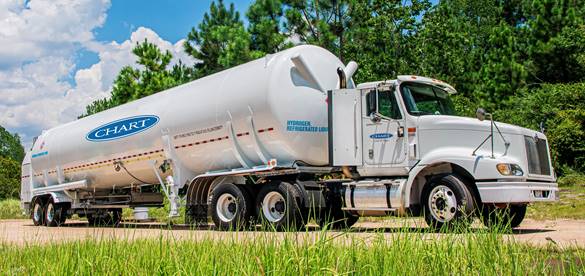 Chart Industries liquid hydrogen transport trailer
Chart Industries liquid hydrogen transport trailer
How is refueling of heavy duty vehicles, like buses and trucks, supported by hydrogen supplied by Chart?
We're a specialized cryogenic equipment manufacturer. We don't don't buy or sell the hydrogen molecule. But as I mentioned before, we're an equipment solution provider for the full supply chain.
So we talked about the onboard vehicle tanks but then we go up through the chain through the fuel stations, through the transport equipment, and all the way up to the liquid hydrogen production.
Specifically on the heavy duty side—like the trucks and buses—our fuel station equipment that we're developing and deploying significantly reduces the current cost that we see out there today—both the CapEx and OPEX—and the footprint requirements of the current high pressure-based delivery or onsite generation systems, utilizing the density benefits of the liquid hydrogen. And the low power requirements needed to pump liquid hydrogen versus compressing the gaseous hydrogen, having to get up to much, much higher pressures.
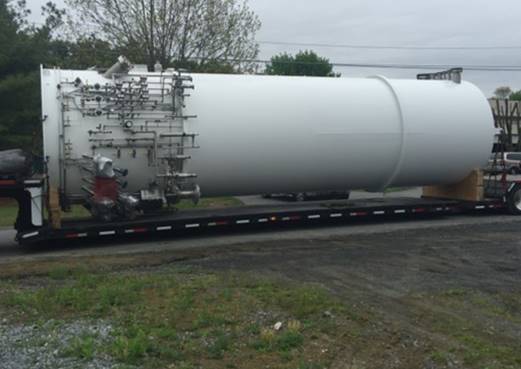 Chart Industries hydrogen liquefaction equipment
Chart Industries hydrogen liquefaction equipment
Some people have anxieties around hydrogen on a safety level. What are some of the things you respond to in the safety category around the handling and the transportation of liquid hydrogen?
Any fuel has inherent risks and dangers involved. And hydrogen is flammable. On the cryogenic side, hydrogen is stored at a very cold temperature. And on the high pressure side, it's a very high pressure energy source. So we have to take all those into consideration and the risk involved with that.
But that said, there's a 50 year history here with utilizing hydrogen and utilizing liquid hydrogen in the public space where it's being trucked around and utilized in different applications. The standards, regulations, and safety requirements have all been developed over that period of time based on lessons learned and research around that topic.
Chart is actively involved in the National Fire Protection Association (NFPA) and the Compressed Gas Association (CGA) to help further those developments. And we're actually just about to get a liquid hydrogen test site up and running at our production facility in New Prague, Minnesota where we're going to be doing all sorts of safety and performance tests around liquid hydrogen for future applications and products to ensure that when they go out into the public they're sufficiently safe.
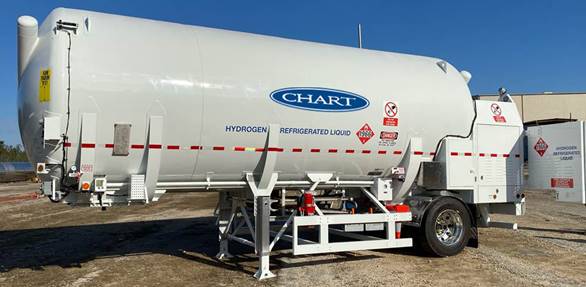 Chart Industries liquid hydrogen transport trailer
Chart Industries liquid hydrogen transport trailer
[Editor’s note: Learn more about hydrogen in this facts sheet]
The storage of hydrogen is a huge element of the supply chain ecosystem. What is the advantage Chart Industries provides when we talk about hydrogen storage?
Chart is the undisputed leader in delivering liquid hydrogen storage solutions. We supplied close to a thousand liquid hydrogen tanks so far, which is the vast majority of the hydrogen tanks out there.
We believe they're the highest quality of tanks being offered today. We have a very high level of vacuum insulation called Super Insulation that is very important for these applications and with a high level of warranty. And it's not just the storage that we're providing and the fueling stations, but we're looking at storage in the overall scheme of the full supply chain. So from liquefaction through to the end use onboard the vehicle, fueling the fuel cell.
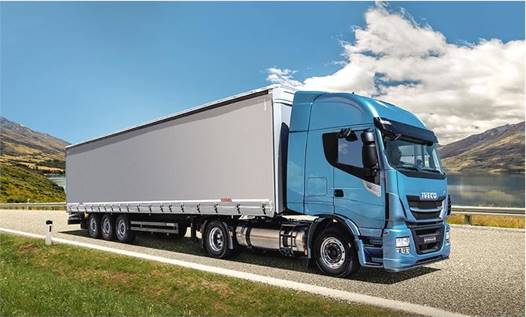 Onboard vehicle storage tank for liquid hydrogen (behind front wheel)
Onboard vehicle storage tank for liquid hydrogen (behind front wheel)
Let’s talk about maintenance. Can you describe the maintenance and service requirements for your on-site hydrogen storage system?
Even though it seems like liquid hydrogen is a space age technology being used in rockets and could be really complex, the equipment itself is quite straightforward on the maintenance side for the storage tanks. For example, I mentioned the vacuum insulation, that's fully self-maintaining and will maintain itself for decades before there's any sort of maintenance required.
The transport trailers, we started building those in the late sixties, early seventies. A lot of those are still on the road today. Of course there are specific requirements for a typical inspection and refreshing of the running gear, axles, and that sort of thing. Normal wear and tear and maintenance for the trailer portion of it.
But the tank itself, hydrogen's very pure. It's maintained at cold temperature, so there's really not a lot of moving parts there, with the quality insulation and the quality welding we have. We also have x-ray inspection and other non-destructive examination strategies to inspect and maintain our products to the highest standards.
What do you see as the best advantage to your partnership with Ballard?
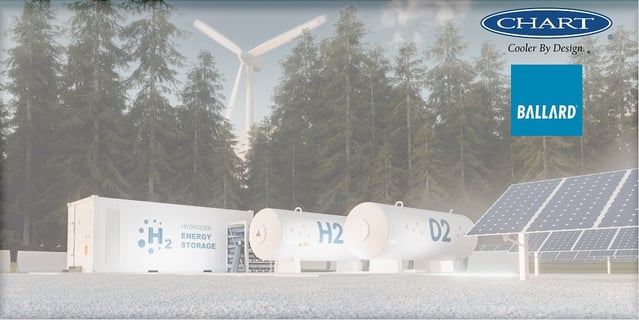
Ballard has been an amazing partner so far. Our partnership is a couple of months old, so we're really just starting off on our journey, but it's been an amazing experience.
We've been able to learn about and utilize Ballard's invaluable partnerships, their expertise in the various heavy-duty applications that we're exploring together, and their experience in the Class 8 heavy duty trucking, transit bus, rail, and marine vessel applications.
Ultimately, with Ballard's unrivaled fuel cell technology, we're really excited to combine our onboard liquid hydrogen storage technology with the fuel cell and to enable accelerated adoption in the heavy duty transport applications. Applications that require long range, rapid refueling and the lowest cost of ownership that you can have for any sort of hydrogen fuel cell vehicle.
Are there any final words you’d like to share about Chart Industries and where you are headed?
Chart is heavily investing in partnerships like the one we have with Ballard, but also heavily investing in new technologies and products to support the expanding market. We saw this happen over the past 30 years with natural gas and utilizing natural gas as a fuel for heavy duty vehicles. So we're ready and we're jumping in with both feet to make sure that the solutions will be there for the marketplace when they're needed.
Fuel Cell Electric Trucks: Solutions for Zero-Emission Transport
Read our brochure on how hydrogen fuel cells provide superior performance for heavy-duty trucks. No email required to access.
